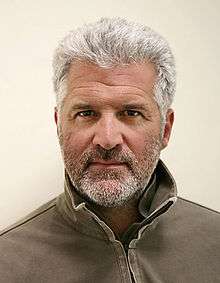Gary Knight
Gary Knight (1964) is a British photographer, architect and co-founder of the VII Photo Agency, the VII Foundation and founder of the VII Academy.

Life and work
Knight was born in 1964 in Oakham, England and was raised in the village of Knowle in the West Midlands. He attended Arden School and Solihull Sixth Form College. Knight left higher education mid way through his first year and started to travel in Europe and the Middle East. He began working as a photographer in the late 1980s in South East Asia and Indochina from his home in Bangkok, Thailand, where he lived variously with photographers Philip Blenkinsop,[1] Emmanuel Dunand[2] and Thierry Falise and writers Alan Pearce and Robert Birsel.
In January 1993, Knight moved to the former Yugoslavia where he became involved in documenting war crimes and crimes against humanity during the civil war. During this period he covered conflicts in Africa, the Middle East and the Balkans and worked widely in Africa, Latin America, the Middle East, South Asia, South East Asia and the Far East (including North Korea) concentrating either on Human Rights and Poverty based issues or current affairs stories for US or European media.
In 2000 with John Stanmeyer he conceived the VII Photo Agency which was launched in 2001. VII was named as the third most influential entity in photography[3] by American Photo Magazine in 2003. In 2005 Knight and a group of friends founded the Angkor Photo Festival and Angkor Photo Workshops to support emerging photographers from Asia. In 2008 he founded with Simba Gill and Mort Rosenblum the print periodical Dispatches. In recent years Knight has covered the invasion of Iraq, the occupation of Afghanistan, the civil war in Kashmir and the Asian Tsunami amongst other stories but central to his work is a commitment to address the issues that determine the survival of the world’s poor and other Human Rights issues.
His work has been published by Newsweek (where he was a contract photographer from 1999 to 2009), Time, The Sunday Times, The New York Times, Paris Match, Stern and National Geographic. His work has been exhibited worldwide and is in the collections of several museums and private collectors. Knight has initiated a broad programme of education with Universities and NGO’s worldwide and is the author of several essays on journalism and photography. He teaches a small number of photography workshops every year, principally in India and Cambodia. He was a Nieman Fellow at Harvard University and an INSPIRE Scholar at Tufts University in 2010. Knight lectures on photography and journalism at Tufts University where he founded and is the Director of the Program for Narrative & Documentary Practice at the Institute for Global Leadership. He resides in Cambridge, Massachusetts.
Knight was chairman of World Press Photo contest in 2008 and 2014,[4][5][6] and a jury member in 2004 and 2006. In 2010 he was Nieman Fellow at Nieman Foundation for Journalism at Harvard University. In 2010 and 2011 he was Inspire Scholar at Tufts University. He has been vice president of the Pierre and Alexandra Boulat Foundation. He was Chairman of the WHO/Stop TB Photography Advisory Board between 2009 and 2011, a board member of the Crimes of War Foundation and a trustee of the Indochina Media Memorial Foundation.
Publications
Publications by Knight
- Evidence - War Crimes in Kosovo. New York: de.MO, 2002.
Publications with contributions by Knight
- Sarajevo. Naythons, 1993.
- The Eye of War. Orion. 2003.
- War. New York: VII; de.MO, 2003.
- Rethink. New York: VII; de.MO, 2004.
- Congo, The Forgotten War. New York: VII; de.MO, 2005.
- Tsunami: A Document of Devastation. New York: VII; de.M), 2005. ISBN 978-0974283609.
- Questions without Answers: The World in Pictures from the Photographers of VII. New York: VII; Phaidon, 2011. ISBN 978-0714848402.
Awards
- 2002: Amnesty International UK Media Award, photojournalism category, for his work on War crimes in Kosovo for Newsweek International.[7]
- 2005: Special Jury Prize (with three others), Days Japan International Photojournalism Awards.[8]
References
- Interview with Foto Evidence, Bachevanova, Svetlana
- Biography, members of grand jury, India - Future of change
- American Photo "100 Most Important People In Photography" Archived June 1, 2007, at the Wayback Machine
- http://www.bjp-online.com/2014/02/these-awards-show-the-consequences-of-a-lack-of-resources-in-the-industry-says-world-press-photos-chair-gary-knight/
- http://www.worldpressphoto.org/news/2013-01-30/santiago-lyon-replace-gary-knight-chairman-2013-world-press-photo-contest
- http://cpn.canon-europe.com/content/news/knight_to_chair_2013_wpph_jury.do
- "Winners and Shortlist" (PDF). Amnesty International Media Awards 2002 Page 1 of 2 Amnesty International Media Awards 2002. Amnesty International. Archived from the original (PDF) on 19 October 2012. Retrieved 30 August 2013.
- "Winner's Names". Days Japan. Retrieved 10 June 2015.